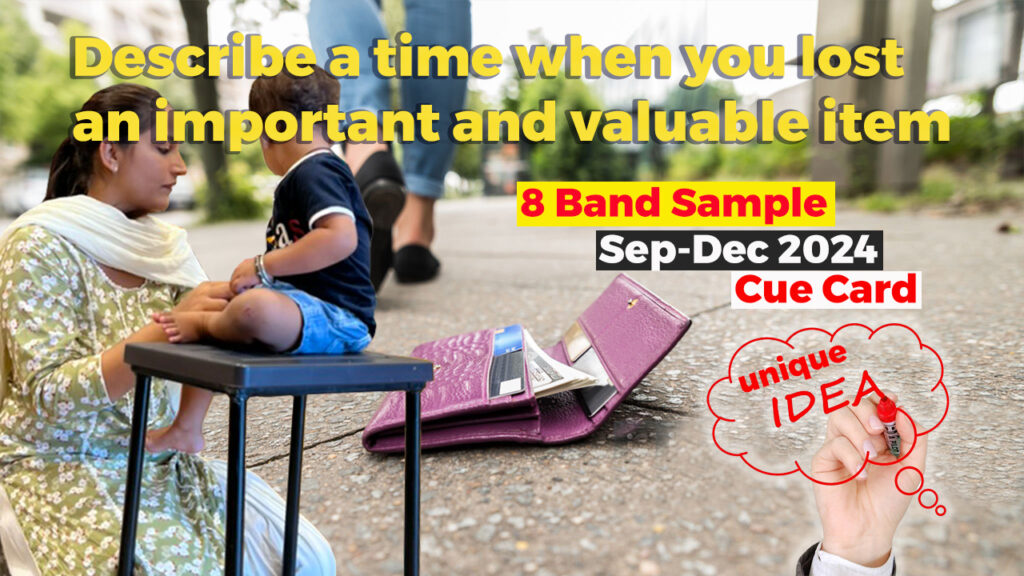Describe a time when you lost an important and valuable item Cue card | September to December 2024
When and where it happened
What is was
How important and valuable it was
How you lost it
And explain how you felt about the experience
VOCAB AND IDIOMS
1. Eidetic memory- strong memory
2. Unforeseen circumstances- unexpected statements
3. Not a cakewalk – not easy
4. Imperative – important
5. Panic- fear, anxiety
6. Unfortunately- sadly
7. Vain- useless
8. Awful- very bad
Well, I have an eidetic memory, so I am excellent at remembering things. However, in some unforeseen circumstances, it was not a cakewalk for me to look after my items. Today, I would like to talk about that imperative item which I lost and regretted.
Actually, it was a frustrating time for me when I lost my wallet in the market, which had significant sentimental value because it was gifted to me by my parents on my last birthday.
Moreover, I realized my wallet was missing when I was paying the shopkeeper after purchasing groceries. I immediately felt panic and disappointment.
After that, I revisited all the places I had visited that day and even asked people I had met if they had seen it. Unfortunately, my efforts were in vain. Despite searching thoroughly, I lost hope of finding it. I realized that rushing through all my tasks that day was my mistake; my carelessness was the main reason I lost my wallet.
Additionally, losing it felt like losing a piece of my personal history. I couldn’t accept the possibility of it being gone forever. I posted about it on social media, hoping that someone might have found it. Despite my best efforts, the wallet remains missing, but the experience taught me the importance of being more mindful regarding my personal belongings. All in all, this is about the time when my feelings were pretty awful and depressing.
Follow-ups
1. Is it important for students to be organized?
Yes, it is crucial for students to be organized. Organization helps students manage their time effectively, ensuring they complete assignments on time and are well-prepared for exams. For example, using planners or digital calendars can help students keep track of deadlines and study schedules, leading to better academic performance and reduced stress.
2. Are there any good ways to remind us not to forget or lose things?
There are several effective ways to remind us not to forget or lose things. Using reminders on smartphones or setting alarms for important tasks can be very helpful. For instance, a student can set a daily reminder to pack their school bag the night before to ensure they don’t forget any essential items. Additionally, keeping frequently used items in designated spots can minimize the chances of misplacing them.
3. What should parents do to teach their children not to lose things?
Parents can teach their children not to lose things by instilling good habits and routines. Encouraging children to organize their belongings and assign specific places for them is a good start. For example, parents can create a checklist with their children for packing school bags or for keeping toys in their designated places. Consistent practice of these habits helps children become more responsible and mindful of their belongings.
4. What do people often do after losing things?
After losing things, people typically retrace their steps to find them. They may also search common areas where the item could have been left. For example, if someone loses their keys, they might check places like their car, kitchen counter, or the last place they visited. Additionally, people might ask others if they have seen the lost item, hoping for assistance in locating it.
5. What are the reasons why people often misplace or lose things?
People often misplace or lose things due to distractions, multitasking, or a lack of organization. For example, when someone is in a hurry or trying to juggle multiple tasks at once, they might put their phone down absentmindedly and forget where they left it. Additionally, not having a designated place for items can lead to them being misplaced more easily.
6. What are some common items that people tend to lose easily?
Some common items that people tend to lose easily include keys, phones, wallets, and glasses. For instance, many people have experienced the frustration of misplacing their car keys, often finding them in unexpected places like the refrigerator or under a pile of papers.



